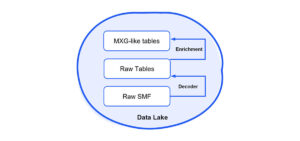
Contents of the Data Lake
The Data Lake contains three types of data arrangements:
- Raw SMF Files: These are the original SMF files provided by the customer, stored exactly as received.
- Raw SMF in Tables: This includes nearly all fields from all supported SMF types, mostly decoded, and organized following the standard IBM SMF naming conventions.
- View Tables: The most useful variables have been pre-selected and organized into view tables and organized following the standard MXG naming conventions. This setup reduces the time needed to find key variables for generating reports, ultimately saving you time and making your data analysis process more efficient and user-friendly.